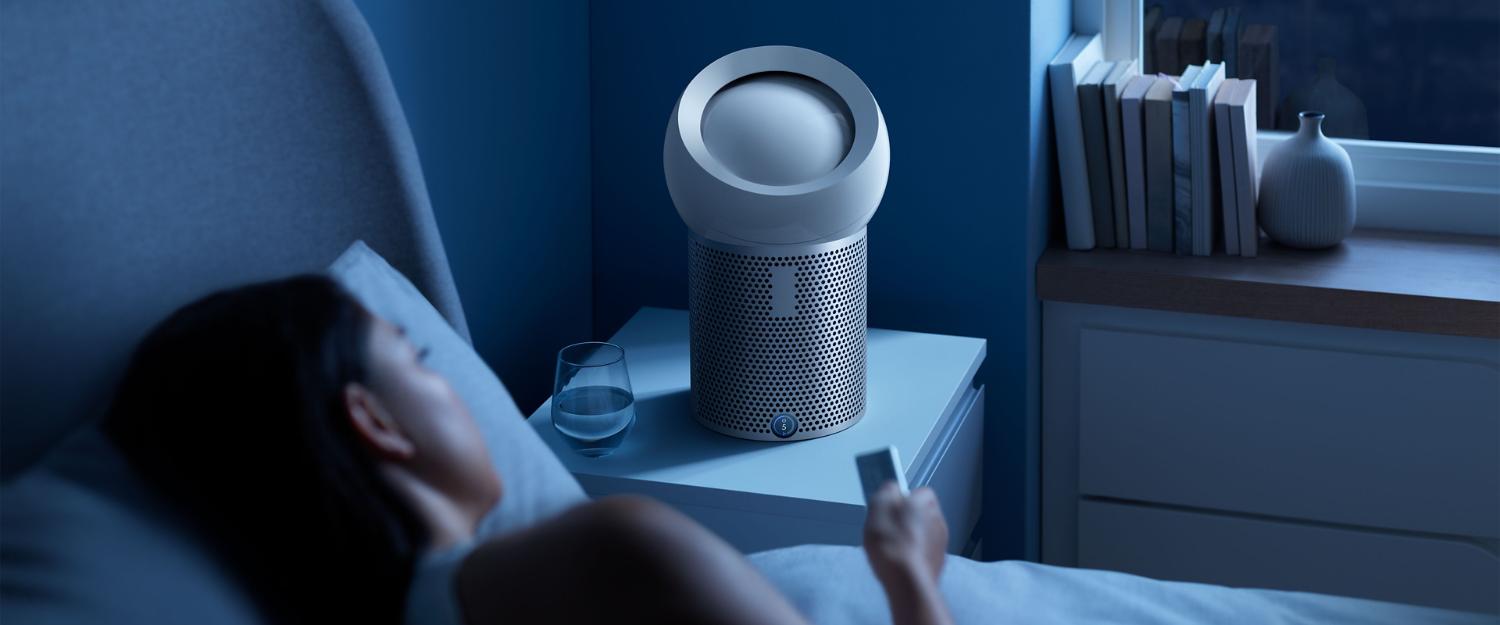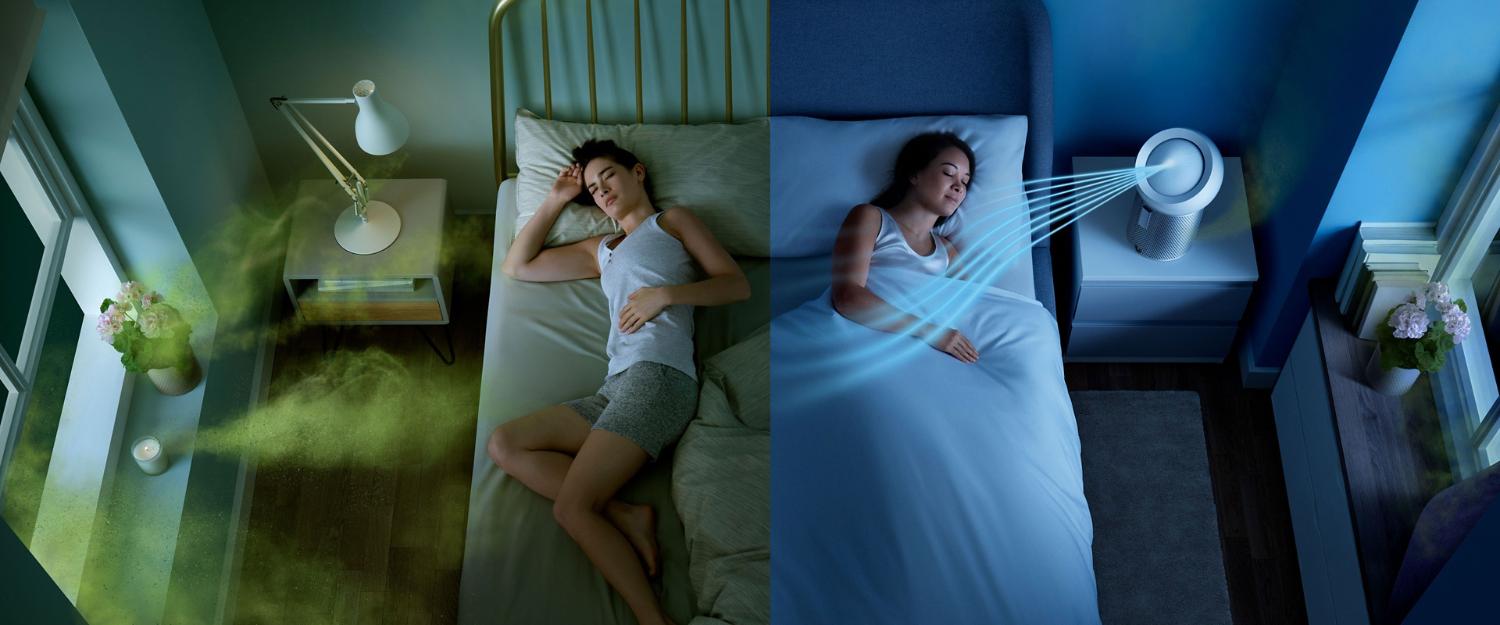Insights | Air Quality
How does indoor air quality affect sleep?
We spend up to 90% of our time indoors¹ and over 17 years asleep. Our sleep microenvironment contains a spectrum of biological particles, and with an average of eight hours of sleep each night, we're continually exposed to bedroom air pollution for long periods of time.
Indoor air pollution can decrease the quality of your sleep and reduce the benefits that come with it.
Air quality can change by season, location, humidity, temperature, and many other conditions in your home. We break down the relationship between indoor air pollution and sleep, plus give you tips for how to achieve better bedroom indoor air quality.

Effects of indoor air quality on sleep
Studies in adults² and children³ have made connections between poor indoor air quality and sleep, including:
- sleep efficiency (the percentage of time in bed actually asleep)
- ability to initiate and maintain sleep
- breathing during sleep
- daytime drowsiness.
Bedroom dust
We share our bedrooms with a collection of biological particles and allergens that are often inhaled during sleep. Mattresses, pillows and bedding can collect house dust mites, allergens, bacteria and fungi from humans and pets. These biological materials can accumulate in settled dust and they're easily agitated when we move during sleep.
While we might be conscious of the dust in our homes, we may not be as aware of the effects it can have on air quality. Dust particles, which are small enough to be airborne, are inhaled through the nose and mouth. The smallest particles can travel into the lungs and may cause illness.⁴
The dust in our home is largely formed of dead skin cells, among other things like pollen, bacteria, and hair. Dust mites – tiny creatures, about a quarter of a millimeter long – live off these dead skin cells. The proteins found in their droppings are one of the major indoor triggers for people with allergies and asthma.⁵ Some people with dust mite allergies experience symptoms such as sneezing, nasal congestion, an itchy nose, a cough and watering eyes.
Most exposure to dust occurs while sleeping and when it's disturbed, such as when bed-making. Dust mite allergy symptoms can all affect the quality of our sleep.
Mattresses and bedding products
Some materials used in mattresses and bedding products contain plasticizers and flame-retardants.⁶ These chemicals are known as Volatile Organic Compounds (VOCs), which can easily be released into the air at room temperature. The longer we spend in close contact with bedroom pollutant sources, the more VOCs we’re exposed to.
During sleep, our bodies also increase the surface temperature of our mattresses, while sweating and the buffering capacity of bedding materials increase humidity.⁷ Increases in temperature and humidity create optimal conditions for house dust mites and help release VOCs into the air.⁷,⁸
Pet hair and dander
Similar to dust mite allergens, pet allergens may linger in the air for long periods of time. With their microscopic size and jagged shape, they easily stick to furniture, bedding, fabrics and can even be carried on items into and out of the home. If you have a pet allergy, it’s caused by proteins that stick to pet dander.
Pet allergens are very light, so they remain suspended in the air and can trigger allergic reactions during the night. This can disrupt your sleep pattern due to the rise in symptoms.⁹ People with pet allergies may experience difficulty breathing, wheeziness, sneezing and nasal congestion.⁹

Pollen
Pollen allergies can cause similar symptoms to dust mite and pet allergies. These include eye and throat itchiness, sneezing and coughing, a runny or blocked nose, and wheezing.¹⁰
With different types of pollen spiking at different times of the year, pollen allergies can cause significant disruption to sleep.
Pollen season starts in spring and may last until autumn, depending on the specific pollen allergy. And if you live in the countryside, symptoms can feel worse compared to city residents due to the raised levels of plantation and exposed greenery.

How to achieve better indoor air quality ?
Improving your indoor air quality and reducing the amount of allergens you’re exposed to can help to reduce the likelihood of allergic symptoms being triggered.
Manage your airflow
We recommend using air purifiers, such as purifier humidifiers, purifier fans and purifier heaters, to take control of your bedroom environment. Dyson purifiers use HEPA H13 filtration and capture ultrafine dust and allergens. They use powerful airflow and capture 99.95% of ultrafine particles¹¹ – so you can breathe cleaner air.
To minimize sleep disturbance, use Night mode for filtration with lower sound levels. Sleep timer enables pre-set intervals of use.
Wash bedding and vacuum your mattress
Pollen, pet dander and dust mites stick to just about anything – including bedding and laundry. It’s important to wash bedclothes and bedding regularly plus vacuum your mattress, as particles can lie deep within the fibers.
Using a powerful handheld vacuum cleaner, you can capture allergens from within your bed. Pair this with a Mattress tool to remove dirt and allergens from your mattress and upholstery. Not only will this support your management of allergy triggers, but it will also help your bed remain a clean and welcoming place to rest.
Regulate temperature and humidity
30% of unwanted heat gain in summer comes from our windows¹² – affecting sleep quality.¹³
Adjusting your body temperature so you feel comfortable enough to sleep can require warmer air in the cooler months and cold air in the summer months. The Dyson air treatment range lets you control your temperature, or increase humidity levels when air is too dry. This helps create better bedtime conditions.
Take control of your air with the Dyson Purifier Humidify+Cool™ Autoreact and enjoy up to 36 hours of hygienic humidification from each tank.

Track pollen on a weather forecast
Pollen can feel predictable but understanding how it changes and develops is key in preparing for those otherwise sleepless nights.
Several apps and forecasts are available, offering advice about pollen count, how to help relieve symptoms, and prepare for the days when pollen is likely to be at its peak.
We know poor indoor air quality is a common source of sleep issues. By reducing your exposure to airborne pollutants and improving home indoor air quality, you're taking a beneficial step towards quality sleep.
Related Articles
Discover Dyson
Visit the archive
Press contacts
Ireland
- Email us at press.office@dyson.com
Social media
- Facebook: facebook.com/dyson
- Instagram: @dyson, @dysonbeauty
- Twitter: @askdyson
- YouTube: youtube.com/dyson
- LinkedIn: Dyson


